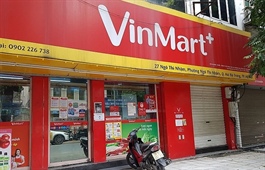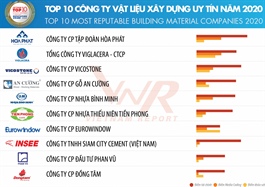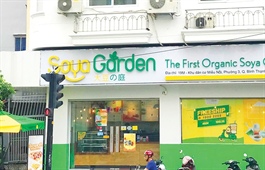Ba Ria-Vung Tau focuses on making its IPs competitive
Ba Ria-Vung Tau focuses on making its IPs competitive
Numerous suggestions for strengthening the competitiveness of industrial parks and developing model industrial parks in the southern province of Ba Ria-Vung Tau were discussed at a seminar held yesterday in the province.
Organised by the Ba Ria-Vung Tau Industrial Zones Authority (BIZA), the seminar, titled “Solutions to improve competitiveness of local industrial parks; developing model industrial parks”, was attended by hundreds of local authorities, experts and investors from the province and neighbouring areas.
They included executives, experts and representatives from the Korean Trade-Investment Promotion Agency (KOTRA), Thailand Board of Investment (BOI), Japan International Cooperation Agency (JICA), and The Japan External Trade Organisation (JETRO).
The seminar collected ideas from experts and investors for inputs for a draft political report to be submitted to the 7th meeting of the provincial Party Committee for 2020-25.
During the seminar, experts discussed a number of issues that require attention when building industrial zones. They also talked about experiences in building standard models of industrial zones and lessons from them and how to go about building standard models.
Foreign experts shared lessons in developing industrial parks from their countries.
A Ba Ria-Vung Tau representative delivered a report on infrastructure development and drawing investment in local industrial zones.
Model industrial parks to be developed
Improving the competitiveness of industrial parks and developing model industrial parks are indispensable trends that provinces and industrial park developers are following because sustainable development is what investors focus on when they begin a project.
Experts said it is now difficult to ensure long-term profits without ensuring environment, socials, governance/sustainable development goals (ESG/SDGs), the three central factors in measuring the sustainability and societal impact of an investment in a company or business because these help determine the future financial performance of companies including return and risk.
Seeing the trend, industrial park developers and Ba Ria-Vung Taus authorities are investing considerably to improve the quality of parks like adopting the Internet of Things and other advanced technologies and applications and generally upgrading infrastructure. They are also soliciting investments in their parks from sectors with high value-addition.
Akira Shimizu, chief representative of JICA Vietnam, said: “In September 2015 the United Nations General Assembly adopted the 2030 Agenda for Sustainable Development, which set the Sustainable Development Goals (SDGs), a collection of 17 global goals designed to be a “blueprint to achieve a better and more sustainable future for all.”
“Many international businesses put more awareness on SDGs, and convert their SDGs awareness into concrete business actions. More specifically, companies prioritise the SDGs based on their relevance to their countries and sectors of operation. Companies must strike a balance between business growth and societal and environmental impacts.”
Many Japanese businesses, as initiated by Keidanren (the Japan Business Federation), place great emphasis on ESG, which contributes to achieving the SDGs, thereby increase the companies values and create its positive image.
In other countries like South Korea, many model industrial zones have been set up including the Korean Free Economic Zone (KFEZ), Incheon Free Economic Zone (IFEZ), Busan-Jinhae Free Economic Zone (BJFEZ), Gwangyang Bay Free Economic Zone, Yellow Sea Free Economic Zone (YESFEZ), and East Coast Free Economic Zone (EFEZ).
In Viet Nam, a number of model industrial parks have been developed to attract foreign investors and provide them with the best investment environment.
“Viet Nams trend is also eco-industrial development, and relevant legislation is under development.” Shimizu said.
The trend is evident in Ba Ria-Vung Tau Province, a member of the Southern Key Economic Zone.
Thanks to the efforts of local authorities and investors, Ba Ria-Vung Tau is now among the provinces in the country with the most developed industrial parks.
Of its industrial parks, the Phu My 3 Specialised Industrial Park (SIP) is one of model industrial zones in the whole country.
Phu My 3 Specialised Industrial Park (Phu My 3 SIP), the only one of its kind in Viet Nam, was established under a Government decision in December 2014. It was built on an area of 999ha in Phuoc Hoa Ward, Phu My Town, Ba Ria-Vung Tau Province by the Thanh Binh Phu My JSC, a 100 per cent Vietnamese private company.
Phu My 3 SIP has world-class technical infrastructure and utilities designed and built by professional global contractors to meet the demands of a wide range of sectors like heavy industry, supporting industries, chemical and petrochemical industries, and multi-sectoral industry.
The park has been investing to complete the synchronised technical infrastructure, providing services of electricity, water, natural gas and industry, telecommunications information ... to the fence of customers' factories. This is a big difference compared to other industrial zones and is trusted and highly appreciated by investors.
Phu My 3 SIP provides comprehensive investment support services in multi languages via a one-stop service that assists customers with all affairs relating to investment procedures, legal issues, recruitment, logistics, and on-site customs services.
With a port inside and logistic services available, the park is an ideal destination for companies in all sectors ranging from heavy industry to chemicals and automobile to supporting industries as it helps them cut costs and enjoy comprehensive services.
The park has an excellent location with access to key traffic infrastructure such as National Highway 51, National Highway 1A, the HCM – Long Thanh Dau Giay Expressway, Bien Hoa – Vung Tau Expressway, the Trans – Asia Road, inter-regional highways, inter-port roads, and inter-industrial zone roads.
Nguyen Thi Thao Nhi, chairwoman of the Thanh Binh Phu My JSC, said her company is strengthening its relationship with international organisations like JETRO, JICA, HCM City Japanese Friendship Club (JCCH), Korea Trade-Investment Promotion Agency (KOTRA), Korean Chamber of Commerce (KOCHAM), American Chamber of Commerce (AMCHAM), and European Chamber of Commerce in Viet Nam (EUROCHAM), Thailand Board of Investment (BOI) to attract more foreign investors to Ba Ria-Vung Tau in general and to Phu My 3 SIP in particular.
Phu My 3 SIP recently attracted 20 projects, among that there are 3 Korean investors, 1 joint venture from Switzerland, 12 Japanese investors with a total capital of around VND22.5 trillion.
Her company has kept investing in infrastructure and amenities to offer tenants convenience.
For instance, it has offices for rent, a conference centre and a restaurant. In future, it plans to build an 18-hole golf course, sports centre and lodging to serve expats working and living in the park.
“Our goal is to develop a comprehensive modern industrial park that meets international standards and attracts investors from diverse sectors while ensuring sustainability and environment friendliness,” Nhi said.
The development of Phu My 3 SIP is clear proof that the development of industrial parks is an indispensable trend the province has to pursue to reach the goal of becoming an international logistics centre, ensuring sustainability and doubling its economy within 15 years.























